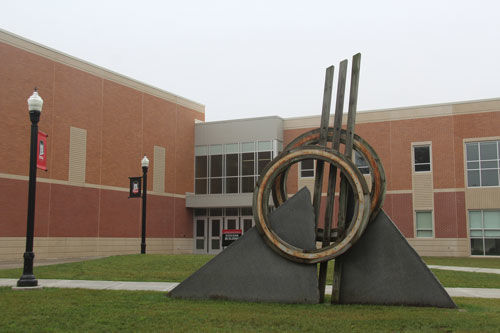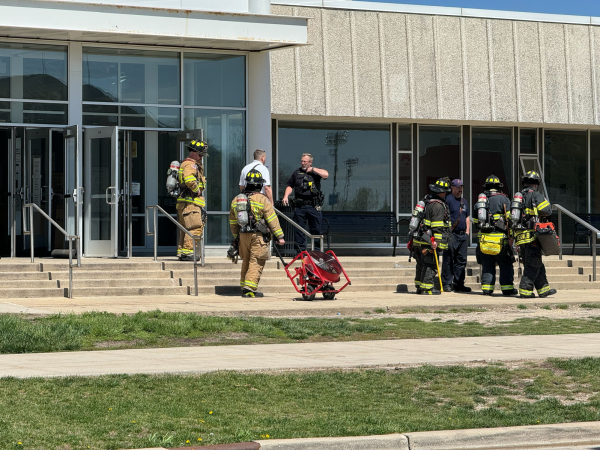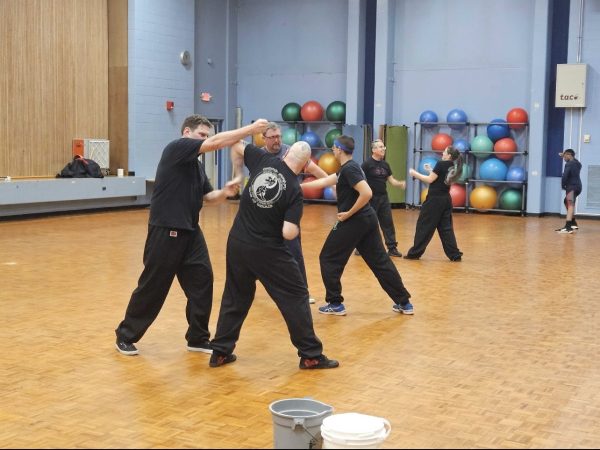Stevens Building in need of additional work despite renovations

The Stevens Building hosted a grand reopening Oct. 12, but not all of the building’s facilities received the necessary repairs.
October 21, 2018
DeKALB — Despite recently completed renovations to the Stevens building, billing $30 million, some issues for its occupants are still present.
The state-funded project was initiated in 2014 but was repeatedly halted until completion this past August. The space was increased by 55 percent to 106,000 square feet, according to a previous Northern Star article.
Anahi Mondragon, junior theatre arts major and design technician with the School of Theatre and Dance, said there are many problems in the day-to-day use of the scene shop and performance spaces.
“The only theater space that had anything done to it was the Black Box,” Mondragon said. “We have these old theater chairs, which are super [crappy] and moldy; they were not renovated, and they were not upgraded in any way, so we’re still working with a lot of old stuff in that respect.”
Mondragon said most of the issues have been centered around the O’Connell Theater, which remains untouched after renovations were said to be done. She also said technicians have continued efforts, including tearing up and reinstalling stage flooring, patching holes in the ceiling and walls, getting rid of raccoons and removing mold.
The problems in O’Connell arose mainly due to the holes. Katelynn Weidman, sophomore theatre arts major, who is also a design technician, said the damage exposed the space to inclement weather, bringing in the intrusion of animals, mold and damage to the stage floor.
Mondragon said the continued renovations were initiated by the School of Theater and Dance after the department observed the work still needed in the respective areas of the Stevens Building. She said an email was sent out Monday, Oct. 15 by the department, three days after the official reopening, asking all available technicians to devote as much time as possible to sanding down and replacing the floor.
“Right now we have work calls for the scene shop employees to stay between 6 and 10 p.m. every day,” Mondragon said. “Normal work shifts are between 2 and 6 p.m; that’s when we work on the shows, and between 6 and 10 [p.m.] we’re here still.”
Mondragon said the School of Theatre and Dance set a deadline for Tuesday to finish the work needed, as the School of Theatre and Dance had to rent a floor sander from Menards to adequately refinish O’Connell’s floor.
Joe Cambroni, a scene shop technician using the floor sander at the time of the interview, said the School of Theatre and Dance couldn’t afford to keep the equipment past Tuesday, creating the need for a solid deadline.
Kevin Nedberg, scene shop supervisor and assistant technical director of design and technology within the School of Theatre and Dance, said the work done on the floor could easily cost $10,000 if done by the original contractors. He said the scene shop’s reinstallation estimates $5,000 in comparison.
Weidman said the renovations have been intruding on the work of the scene shop. The scene shop is currently constructing the set for the School of Theatre and Dance’s production of “The Importance of Being Earnest.”
“We’re rushing, so it’s very irritating to come in and not have everything done,” Weidman said. “I don’t blame [the School of Theatre and Dance] at all. We’re doing what we need to get finished, to get this building where it needs to be.”
In addition, technicians said the scene shop has some operational issues that make its use hard to navigate. Nedberg said the size of the loading dock has presented issues with transporting materials to and from the shop.
Nedberg said due to the addition of a fire suppression system by the door, the loading dock had to be sized down to comply with the structure.
Nedberg also said the adjoining parking lot to the scene shop was inadequately paved, resulting in patchwork asphalt, which he believes will cause potholes in the spring. Another issue cited by Nedberg was the sparse outdoor lighting in the lot, which has made shop technicians feel unsafe when leaving productions late at night.
He said he feels obligated to escort technicians to their vehicles in teams of two due to recent safety concerns on campus.
Despite complaints, scene shop technicians repeatedly emphasized their gratitude for the building.
Mondragon and Weidman said they greatly appreciated the new scene shop and equipment after having worked in the basements of Grant Towers for five previous years after renovations were put on hold due to NIU’s budget impasse.
“It’s a lot better than what it was,” Mondragon said. “I mean, we were performing in a middle school. Anything outweighs a middle school when you’re trying to get a theater degree.”
However, she still wants NIU to recognize the problems at hand.
“Even after five years, there’s still so much to do,” Mondragon said.












